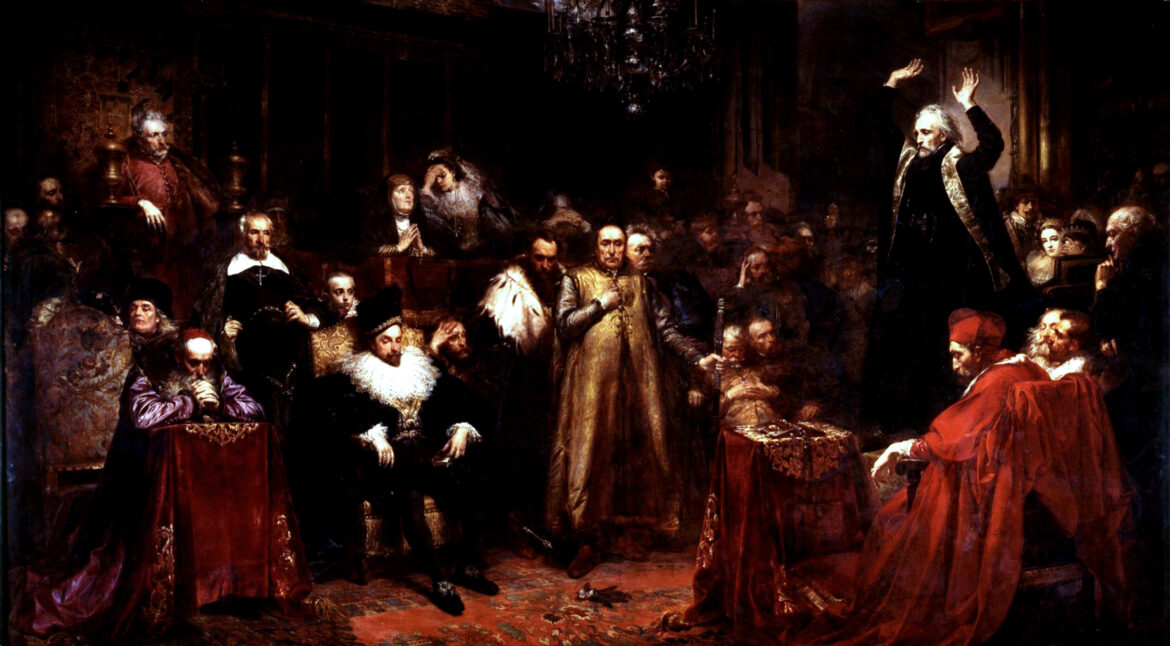“Skarga is a tribune, a prophet, but above all he is a Pole”, said the poet Adam Mickiewicz in his Parisian lectures at the College de France after the fall of the November Uprising. What was the phenomenon of Father Piotr Skarga, whose work still exemplifies a rich oratorical style, combining references to events in Polish history, modelled on biblical prophetic books?
After studying at the Krakow Academy and being ordained a priest, Piotr Skarga went to Rome, where he joined the Jesuit order. From then on, preaching was the most important, though not the only, his activity. He left a lasting legacy of his philanthropic work. He was the founder of the Archbrotherhood of Mercy in Kraków and the Pious Bank. He rendered great service to the development of scientific institutions in the First Polish Republic. Skarga was the first rector of the Vilnius Academy, founded in 1579 by Stefan Batory, and initiated the establishment of Jesuit colleges (e.g. in Lublin, Polotsk, Riga or Dorpat), which played an extremely important role in the comprehensive education of the Polish elite.
Skarga’s contribution to the development of Polish literature at the turn of the 16th and 17th centuries was immense. “Lives of the Saints” by him was a bestseller in the pre-partition Republic, but his best-known work is “Sermons of the Sejm”. This is a record of the sermons he preached as royal preacher at the beginning of the proceedings of the successive Sejms of the Republic. It is not only a description of the weaknesses of the Commonwealth, but also an expression of great concern for the repair of the state. In his sermons, he predicted the downfall of the Polish-Lithuanian Commonwealth, which was then conquering Moscow (1610) and taking the Moscow Tsar captive when Piotr Skarga was still alive.
For Skarga, loving the homeland was synonymous with fulfilling a religious duty: “Love this homeland of yours and this Jerusalem of yours, that is, Polish-Lithuanian Commonwealth”. In his “Sermons of the Sejm”, Skarga expressed the idea of patriotism by means of metaphors, e.g. using an analogy with a mother: “How could you not love and honour your most beloved mother, who gave birth to you and brought you up, bestowed on you and raised you up? God has commanded you to honour your mother. Cursed is the man who grieves his mother. And who is the first and most meritorious mother, if not the motherland, whose name you have and all that you have is from her, who is the nest of all mothers and all your affinities and the repository of all your goods”.
The author of the “Sermons of the Sejm” claimed that all the defects and weaknesses of the Commonwealth stem from a lack of love of the Homeland. At the same time, he condemned the exploitation of peasants by the nobility, the loss of respect for the institutions of the state, and the lack of “domestic concord”, i.e. solidarity between the inhabitants of the country. Skarga justified the need for cooperation in public matters by using the metaphor of a sinking ship, i.e. a homeland demanding the solidarity effort of the “crew” i.e. of all citizens. The Jesuit condemned examples of the most flagrant discord, which were the Sejms of the Republic. Criticism of the manner of the Sejm, however, was part of the broader political vision of Skarga, a great supporter of strong monarchical rule, and was linked to the postulate to strengthen the position of the King and the Senate as the King’s foster council.
The eminent Jesuit emphasised that ‘when one does not rule and does not moderate human differences, it overthrows the kingdom with discord’. He argued that “the monarchy is an imitation of the heavenly government upon which one God alone seats”. On the other hand, the royal preacher was not a supporter of the unlimited power of the ruler. Like the entire elite of the Commonwealth, he adhered to the idea of power based on law and proclaimed that the state should be ruled ‘not by the king, but by the law’. In Skarga’s conception, the ruler was to be strengthened in his powers, but at the same time he should be part of a system which the preacher called ‘freedom of the law’ or ‘true freedom’, being not as much freedom from tyrannical rule, but rather ‘freedom to serve and be subject to the laws and orders of the kingdom and the Republic, having settled in one kingdom and under one master’. Skarga contrasted orderly freedom with “devilish freedom”, which consisted in “living without law, without authority, not caring about superiority, not subordinating oneself to wiser and older people”.
Mentioning those who made the law in Poland, Skarga recalled the principle, derived from Greco-Roman antiquity, that laws “are to cultivate and instil human virtue, and to give it every defence”. Skarga’s message was a call to repentance and the repair of the state, which was to begin with the improvement of individual citizens. For this reason, he stressed that the Republic needed people who were competent and prepared to govern. The preacher also pointed out that consensus in religious matters in the state influenced order in secular affairs, which is why he was a supporter of the Union of Brest, the merger of the Orthodox and Catholic Churches and the creation of the Uniate Church.
The fashion for reading Skarga’s warnings arose among Poles after the partitions of the Polish-Lithuanian Commonwealth, when, as it was believed, his prophecy from the “Sermons of the Sejm” that “the great lands and principalities, which were united into one body with the Polish Crown, will fall away and break apart because of your discord” was fulfilled. His works were even more popular after the defeats of the successive uprisings. The image of the prophesying royal preacher, inclining to reflection, was also preserved in Jan Matejko’s well-known painting, The Sermon of Skarga (1864).





